The Role of the Church
John Campbell-Nelson serves the Evangelical Christian Church of West Timor.
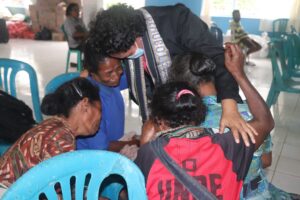
Cyclone Seroja victims.
Throughout the pandemic, I have been in the habit of taking daily walks around the rice fields behind our house. Open space, a constant breeze, and the ease of keeping social distance from the neighbors I pass means that it is a pretty safe way to stay connected with the world outside our gate. Yesterday I met a farmer on the path, and we both commented on the abundant water flowing in the irrigation channels. In the recent past there had been shortages leading to conflicts over sharing the water equitably among all the farmers, but this year there is enough water to irrigate every inch of the rice paddies.
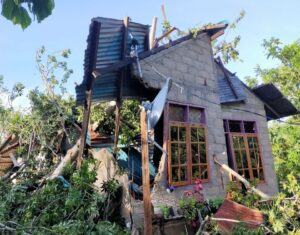
My friend observed that this abundance was an unexpected benefit of Cyclone Seroja, which hammered our island last Easter. Over 12,000 homes and hundreds of churches were destroyed or seriously damaged, crops and gardens were destroyed, and 229 people were killed. At the same time, it dumped enough water on us to fill the reservoir to overflow. There will be enough water to ensure a decent harvest for several seasons to come. My own garden also benefitted. When the floodwaters receded my soil got a fertility boost that is reflected in a bumper crop of tomatoes and cabbages that are sweet as apples.
This encounter set me to think again about the pandemic. The tragedy has been immense, and there can be no balancing of profit and loss. But still, I can’t help but ask: Has our two-year battle with Corona also produced unexpected benefits? That seems hard to imagine given Indonesia’s current crisis, with record numbers of infections, hospitals overflowing, and oxygen supplies running out. GMIT (the Evangelical Christian Church of Timor) has opened and closed its churches several times, and we have lost many members and at least eight pastors to Covid-19. Three of the five members of the synod executive council are currently ill with Covid. After an initial reluctance to be vaccinated, the delta variant has sent thousands off in search of vaccine sites, often producing crowds that threaten to turn vaccination itself into a super-spreader event.
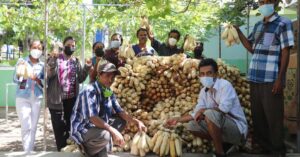
Even so, I believe these trials have strengthened the church, and I have never been more proud to be a part of GMIT. Early on, when many religious communities made ignoring Covid a test of faith, GMIT closed the city churches and sent out an extensive list of guides for how to do worship and ministry while respecting health protocols. In areas where there were no reported cases of Covid-19, worship was conducted in shifts to maintain social distancing, and there were washing stations at every door (ironically, right where the baptismal font used to stand in early churches) and masks available for worshippers who “forgot.” City churches began to broadcast worship on YouTube, and suddenly young people with media skills became highly valued servants of the church, not just kids with new-fangled hobbies.
We learned how to Zoom. Meetings of church councils, seminars, and continuing education shifted online, as did seminary classes. I supervised nine theses and dissertations without once having a physical meeting with the students. We soon realized that it was no more expensive to invite a seminar speaker from Holland than it was to invite one from Kupang. A theological discussion series on the church’s response to Covid included speakers and participants from all over Indonesia, East Timor, Malaysia, Holland, and Germany for only the cost of an internet connection. GMIT pastors had free consultations with a pastoral counselor living in Sacramento.
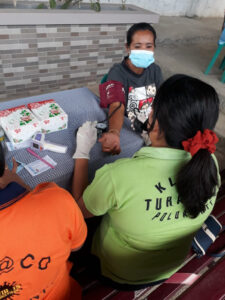
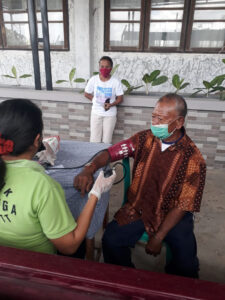
I could go on listing practical adaptations, but these are just on the surface. More important changes are underway at a deeper level. I believe the pandemic, and later Cyclone Seroja, have changed how people understand the role of the church. At the start of the pandemic, people turned to their pastors for explanations about this new threat, which is why it was so important to make sure pastors got solid information as quickly as possible. As I write, our local church is serving as a vaccination site; members of our household are getting their second shot at last. The network of communication and education that is part of being the church has come to the fore as one of our great strengths, which in turn lays the groundwork for the church to serve as an outlet for health care, economic development, and other aspects of community life not normally on the weekly calendar of prayer and worship. In the past, the church’s involvement in social and economic life was often criticized as detracting from its “real” work of preaching and worship. Seeing the central role the church has played in the response to both Covid and Seroja, I don’t think we will hear that complaint so much in the future.
A phrase we have been hearing often in response to the pandemic is “caring for life,” and I think that points to the shift I see in people’s sense of what the church is about. For many years, people had it drilled into them that regular attendance at public worship was a fundamental duty of all Christians. When the churches were closed or attendance was curtailed, it was only natural that people rebelled. What could be more important than the worship of God? The answer that seems most to satisfy that challenge is this: caring for the life that God created is also a fundamental duty. By refraining from gathering in crowds and finding other ways to worship, we are caring for life. I believe in the long run that the rebalancing of worship and life will be a source of renewal for the church in Timor. By no means everyone agrees, and there are constant negotiations, but I can’t believe we will go through so much suffering and remain unchanged.
We are well, and we pray that you are too. Our plans are to return to the US in October for an extended time. Perhaps we will have a chance to see you. Until then, may God bless you all.
John Campbell-Nelson serves the Evangelical Christian Church of West Timor. His appointment is made possible by your gifts to Disciples Mission Fund, Our Church’s Wider Mission, and your special gifts.
